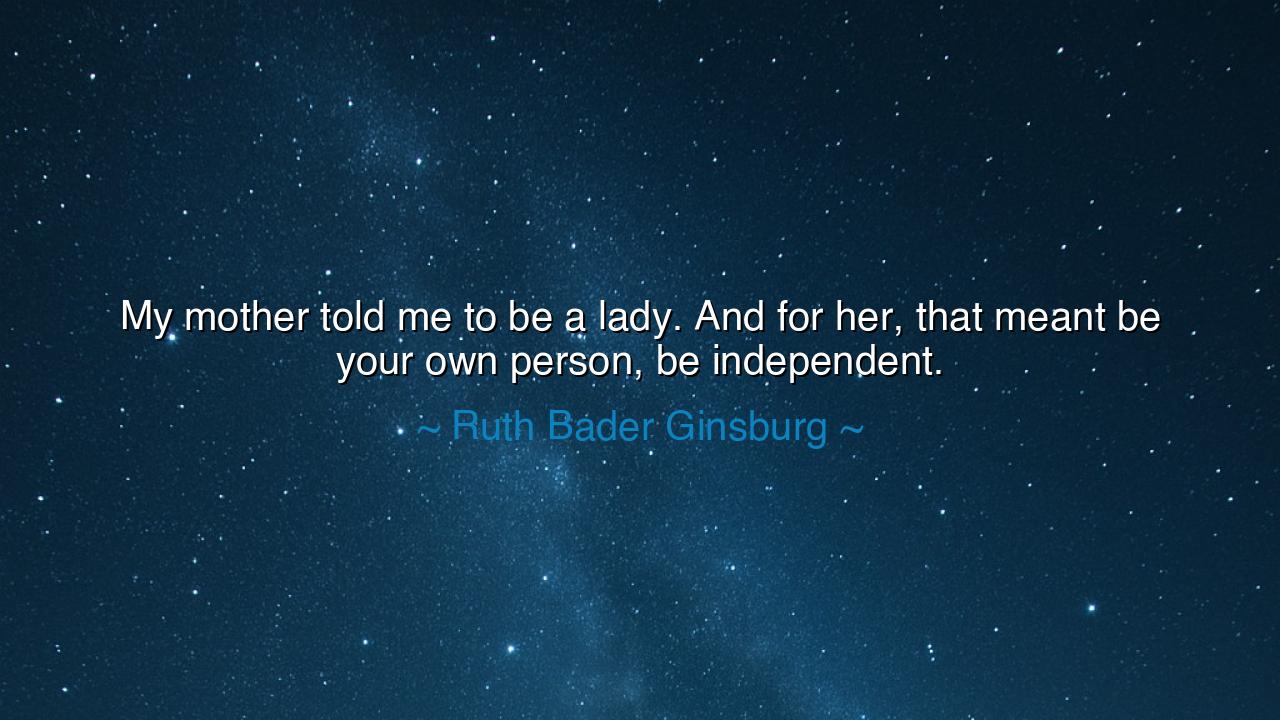
My mother told me to be a lady. And for her, that meant be your
My mother told me to be a lady. And for her, that meant be your own person, be independent.






Hear the words of Ruth Bader Ginsburg, a woman of justice, a warrior of quiet strength, and a beacon to generations: “My mother told me to be a lady. And for her, that meant be your own person, be independent.” In this saying lies a profound redefinition of what it means to be a lady — not one who bows to convention, but one who stands upright in her own dignity. The wisdom of her mother, Celia Bader, was not the teaching of refinement or restraint as society once dictated, but of independence, self-possession, and the courage to think and act as one’s own master. In Ginsburg’s remembrance, the word “lady” transcends etiquette and becomes an anthem of freedom.
The origin of this quote reaches back to Ruth’s early years in Brooklyn, during a time when women were expected to be dutiful, silent, and dependent. Her mother, who worked tirelessly and valued education above all else, saw in her daughter the spark of a new kind of woman — one who would not merely live within the lines drawn by others, but one who would redraw them. When she said, “be a lady,” she spoke as a prophet of her time — calling not for submission, but for sovereignty of spirit. To be one’s own person meant to live by principle, not permission. It was this inheritance — the fusion of grace and grit — that Ginsburg carried into every courtroom she entered, every opinion she wrote, and every injustice she confronted.
This teaching, though born in a mother’s home, echoes through the wisdom of the ancients. In the dialogues of Plato, we are told that virtue is not the adornment of obedience but the mastery of the self. Likewise, Ginsburg’s mother taught her that true elegance comes not from pleasing others but from possessing one’s own mind. The Greeks called this autarkeia — self-sufficiency, the ability to stand firm regardless of fortune or opinion. And so, Ginsburg’s “lady” is not fragile; she is deliberate. She does not flutter in the wind of praise or judgment; she stands, calm and resolute, as the architect of her own destiny.
Consider the story of Hypatia of Alexandria, the philosopher and scientist of the ancient world. In a society that sought to confine women to silence, she dared to teach men the stars. When mobs demanded her submission, she met them with intellect and dignity, refusing to renounce her pursuit of truth. Like Ginsburg centuries later, Hypatia embodied the marriage of intellect and integrity — she was a “lady” in the truest sense, independent in thought and fearless in conviction. Both women, separated by ages, reveal the same eternal truth: that to be noble is not to be compliant, but to be independent, self-directed, and guided by reason and justice.
Ruth Bader Ginsburg, through her life’s work, transformed her mother’s wisdom into law itself. When she stood before the Supreme Court to argue for gender equality, she was not merely fighting for women — she was fighting for the right of every soul to define their own worth. She believed that independence was not rebellion but responsibility — the responsibility to think, to act, and to stand for what is right, even when the world does not yet understand. Her composure was legendary, her arguments precise, but beneath that calm lay the fierce heart of a woman who had learned, long ago, that to be one’s own person is to be unbreakable.
Her mother’s lesson, therefore, is not a relic of the past, but a compass for all who would live with integrity. To be your own person means to listen to your conscience above the crowd, to labor not for approval but for truth, and to hold your independence sacred even when it is tested. It means to act with respect, not submission; to be kind, but not compliant; to serve justice, not comfort. The world often demands conformity in the name of civility, but true civility — the kind Ginsburg’s mother taught — is born of self-respect and moral courage.
O listener, take this teaching into your heart and live by it: let your gentleness be your strength, your independence your grace. Honor the legacy of mothers and daughters who came before you, who dared to define what it means to be “a lady” in their own image. Seek wisdom, but question authority. Walk with humility, but never in another’s shadow. Let no voice tell you what you are worth, and no fear chain your will. For the greatest gift a parent can give a child, and the greatest virtue a person can cultivate, is the courage to be one’s own person.
Thus, let the words of Ruth Bader Ginsburg echo through the ages as both tribute and teaching: to be a lady is to be free — free in thought, free in choice, free in spirit. Be refined in principle, fierce in independence, and steadfast in truth. For the soul that lives by its own light will never be dimmed, and the nation built by such souls will never lose its way.






AAdministratorAdministrator
Welcome, honored guests. Please leave a comment, we will respond soon